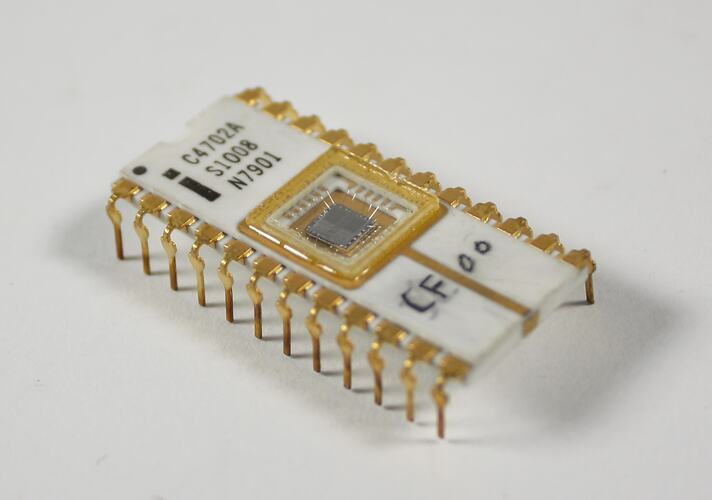Summary
This is an Erasable Programmable Read Only Memory (EPROM) chip, type 4702A, manufactured by Intel. It is used in microcomputers and can hold 256 word x 8 bits of data with an access speed of 1.7µs. The memory can be erased by exposing the chip to ultraviolet light.
Physical Description
A white rectangular sheet of plastic with 24 gold-plated pins protruding (12 pins each side) along two sides. There is a central square cut-out which shows a small square metallic component (chip). There are numbers printed on the white plastic (both sides) and a number handwritten in pencil.
More Information
-
Collecting Areas
-
Manufacturer
-
Inscriptions
Printed: " i [intel corporate symbol] ", " C4702A / S1008 / N7901 ", " Malaysia / 7523 " Handwritten, pencil: " CF 00 "
-
Classification
-
Category
-
Discipline
-
Type of item
-
Overall Dimensions
30 mm (Length), 15 mm (Width), 7 mm (Height)
-
References
Manufacturer's datasheet for the Intel 4702A EPROM from Google Docs: "The 4702A is a 256 word by 8 bit electrically programmable ROM ideally suited for microcomputer system development where fast turn-around and pattern experimentation are important. The 4702A undergoes complete programming and functional testing on each bit position prior to shipment, thus ensuring 100% programmability. The 4702A is packaged in a 24 pin dual-in-line package with a transparent quartz lid. The transparent quartz lid allows the user to expose the chip to ultraviolet light to erase the bit pattern. A new pattern can then be written into the device. This procedure can be repeated as many times as required. The circuitry of the 4702A is entirely static; no clocks are required...The 1702A is fabricated with silicon gate technology. This low threshold technology allows the design and production of higher performance MOS circuits and provides a higher functional density on a monolithic chip than conventional MOS technologies." [Link 1] - Retrieved 6 Oct 2010 (M.Vaughan)
-
Keywords
